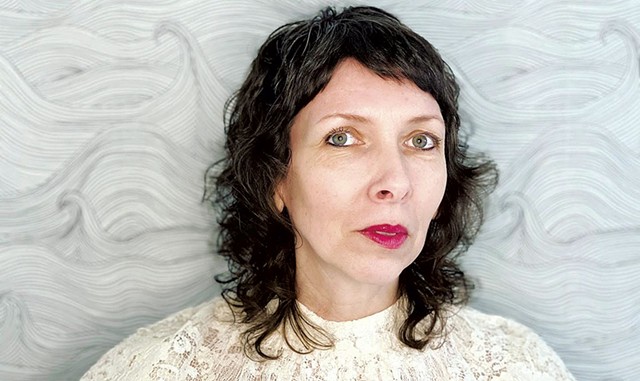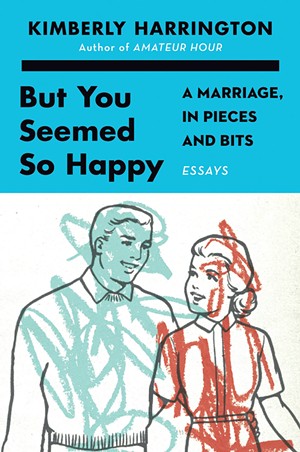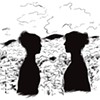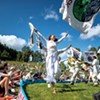click to enlarge 
- Courtesy
- Kimberly Harrington
Kimberly Harrington began working on her second book, a memoir of her marriage and impending divorce, six weeks after she and her husband announced their separation and seven months after the publication of her first book, a memoir of motherhood. She doesn't recommend mining your life for your art. "And if you do do it," she suggested via email, "maybe don't do it again?"
Her latest collection of vignettes and essays, published in October, is called But You Seemed So Happy: A Marriage, in Pieces and Bits. It isn't quite a tell-all, as the subtitle hints, even as Harrington, 53, dissects some of the more painful moments in her relationship with an unsentimental precision that will make your face hot. She alternates between exhuming her past — her '80s latchkey upbringing; her first date with the man who would someday become her ex-husband, a date on which she scarfed an entire bag of sour-cream-and-onion chips and a liter of Diet Coke in his car — and lampooning the whole concept of marriage.
That institution's gifts to the culture, she observes, include such ritualized forms of cringe as the engagement photo shoot. "Why are you on a cliff?" Harrington asks in one of the book's essays, titled "Some Questions for Men in Engagement Photos." "Also: Why a tie? But you're on a cliff? Is it a formal cliff?"
Throughout the book, Harrington, whose work has appeared in McSweeney's Internet Tendency, the New Yorker and the Cut, confronts her flaws and her unreasonable expectations of marriage. The things we ask of our spouses are so objectively insane, she argues, that we should be more astonished when two people don't get divorced.
"I thought marriage was the last place," Harrington writes in the preface. "Instead it is just one place." She still lives, amicably, with her soon-to-be ex-husband and their two children in northern Vermont.
Harrington spoke with Seven Days about the absurdity of sleeping with one person for the rest of your life, calling herself out on her bullshit and finding the humor in what doesn't feel funny.
SEVEN DAYS: You started working on this book shortly after you and your husband decided to get divorced. Was it hard to jump into writing about something so emotionally intense while it was still relatively fresh?
KIMBERLY HARRINGTON: In some ways, it wasn't as hard as I expected, and I don't know if it's because I had already been through most of the hard things that I was writing about. I was done with the book a year before it came out, and I was writing it for a year and a half before that. So people will email me now and give me some weird pep talk about shit I went through, like, five years ago at this point. But while I was writing it, I wasn't crying on my laptop, which I did when I was writing my first book. Maybe I'm just dead inside.
SD: You also dug into the past to help you understand how you got here, which took you back to the start of your relationship with your now ex-partner. What did that feel like?
KH: At first, I was pretty unforgiving of myself, which I think is common when things don't work out. You think you were an idiot; you put it all on yourself.
And then, when I really dug back, a few things stood out, one of which was that I was really in love. I mean, I've never doubted that. But when I looked back and saw that all my friends and I were going to weddings, that we all wanted this to happen — this has been going on forever. You go to weddings, and then you feel like, When am I going to be able to do that? So I felt a lot more empathy and forgiveness for myself for having taken that path, because everything told me to take that path. And it made me feel like I belonged, like I was a good adult and I was doing things in the right order.
SD: That part of your book hit me particularly hard, because everybody around me is suddenly getting married, and it just feels like this frenzy of monogamy.
KH: Yeah. There's definitely that point where the rubber meets the road, even for people who were talking a big game. Kids are a driver, for sure. I never had doubts about getting married. I never had doubts about wanting kids. I'm not against marriage. But I think whenever you talk about being OK being alone, or never getting married in the first place, I think what happens — and I don't see men being treated this way — is that people make you feel like there must be something wrong with you, like you can't just live your life and be left alone. That adds pressure, and even when that pressure is not overt, it's there. We get that message from absolutely every direction.
SD: And part of that messaging is that, once you decide to marry someone, that relationship should fulfill all your needs and desires and also shield you from the pain and monotony of existence.
click to enlarge 
- Courtesy
- But You Seemed So Happy: A Marriage, in Pieces and Bits by Kimberly Harrington, Harper Perennial, 304 pages. $16.99.
KH: It's really pretty dumb. One of the pieces in the book grew out of conversations with my friends about what a miracle it is that I have lived with another adult person for 25 years. When I think of all the roommates I've had, when I think about me as a person and how difficult I am to live with, I'm like, Why is no one congratulating us for being two adult human beings who have lived in the same space for this long?
And you're sleeping in the same bed. And you have to eat the same meals. And you've got to watch the same shows. And you've got to love all the same stuff. And you have to have really great sex. We don't put those pressures on any other relationship in our lives. And then the whole thing just got funnier and funnier to me, like, is no one thinking about marriage in this way? Because this seems destined to fail every time.
SD: Our culture isn't very forgiving of women who end relationships, particularly when there's nothing catastrophically wrong — like, if your partner is a nice, good person, and you, a woman, are still unhappy, then the problem must be you. You're pretty unsparing in your portrayal of your faults — you refer to yourself once, for instance, as "King Dipshit." Meanwhile, your husband comes across as a very decent, likable guy. Were you playing with those tropes in your depiction of yourself?
KH: I mean, anyone who's met us would agree with me. He's a really nice, friendly guy who never gets mad at anyone, and I've got a totally hostile personality in certain situations. So that wasn't a performance or anything. But I think the knee-jerk reaction is to look for the faults, to look for the asshole in the equation. And that's just not what happened. That doesn't mean that there isn't fault in both of us, or good things in both of us. It was a really good relationship for a really long time — and ultimately, it's just one relationship. So I'm not going to feel too bad about where we ended up.
We've all read books, especially memoirs, where you know that the author is trying to make themselves look better. I was really direct with myself in my edits — like, Am I just putting this in here to make it sound like I was a cool girl in my twenties? Take it out! When you're the one writing the book, and you're writing about real people, including yourself, I think you owe it to the reader to be honest and not to be unnecessarily hurtful — and if you feel the desire to be hurtful, to ask yourself if you're doing it to fuck someone over in a book, because you get to write a book. That's not what I'm interested in doing.
SD: Is it cathartic to be that direct with yourself on the page?
KH: It is. Because you realize that you're wrapping yourself in a lot of layers of justification and hurt feelings, and as you strip that stuff away when you're writing, it gets real, real fast. We can all get enamored with what we're writing and find ways to justify it. But that's not going to work when you're talking about a relationship that involves two people and the other person is not writing the book.
SD: Has it gotten easier for you over time to zero in on your bullshit?
KH: This is all pretty new for me. I haven't done personal writing for very long — I was writing a little bit in my twenties, but I stopped all my personal writing until, like, six years ago. So I'm working on getting my writing up to the level where my point of view is in life. I want the writing to match how I feel in the conversations I have with my friends, when we're digging really deep and having no-bullshit talks. It's easy to be super voicey and make little self-deprecating jokes and stuff; it's harder to strip that away and figure out what you're really trying to say.
SD: There's some heavy stuff in your book, and it's easy to imagine how the final result might have been fairly depressing in another writer's hands. What does humor allow you to do in these essays that wouldn't necessarily be possible with a more sober approach?
KH: I process everything through humor, and I have for my whole life. So humor doesn't feel like a lens I chose. But with the painful and raw moments in this book, it helps to have these breathers. And it also allows me to comment on bigger things or process stuff I'm pissed about in a way that's not really about me. With personal essays, I feel like, Who knows what I'm doing? When is this going to end and how? But humor pieces are satisfying in the way that puzzles are satisfying. They need to be short, and they need some kind of format, and when they work, there's a quick-hit satisfaction, which essays do not provide for me, personally, at all.
But part of the issue with memoir, which I've been through twice now, is that people think they really know you and your whole story and they want to be friends with you across the internet. At the end of the day, this book is 300 pages. It's full of humor pieces. I'm framing this up for you the way I want to frame it up. It's not the full story, and you're never going to have the full story. If you did, it would be 50,000 pages and it would be boring as shit. This interview was condensed and edited for length and clarity.






















































